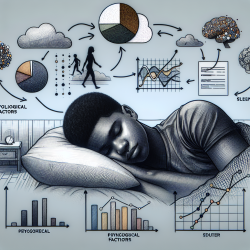Introduction
The research article "Global health governance in the sustainable development goals: Is it grounded in the right to health?" by R. Van de Pas et al. provides a critical analysis of the current state of global health governance within the framework of the Sustainable Development Goals (SDGs). The article highlights the gap between human rights frameworks and the practical implementation of global health policies. As practitioners in the field of speech-language pathology, it is essential to understand these dynamics to improve outcomes for children and advocate for their right to health.
Key Findings
The research identifies four essential functions of the global health system: production of global public goods, management of externalities, mobilization of global solidarity, and stewardship. These functions are crucial for ensuring that global health policies are aligned with the right to health. However, the article argues that current representations of the right to health in the SDGs are insufficient, as they do not explicitly link commitments to binding treaty obligations or entitlements for individuals.
Implications for Practitioners
As speech-language pathologists, understanding these governance gaps can help us advocate for better health policies that prioritize the needs of children. Here are some actionable steps practitioners can take:
- Advocate for Policy Change: Engage with policymakers to emphasize the importance of including explicit right-to-health commitments in global health policies.
- Collaborate with Stakeholders: Work with international organizations, NGOs, and other stakeholders to promote policies that address the needs of marginalized communities, including children with speech and language disorders.
- Participate in Research: Contribute to research that examines the impact of global health policies on children’s health outcomes, providing data-driven insights to support policy changes.
Encouraging Further Research
The article suggests that future iterations of global health policy must bridge the gap between human rights frameworks and practical implementation. This includes scholarship and policy debate on the structure, politics, and agency needed to overcome existing global health injustices. Practitioners are encouraged to engage in research that explores these areas, contributing to a more equitable global health system.
Conclusion
By understanding the governance gaps identified in the research, speech-language pathologists can play a crucial role in advocating for policies that ensure the right to health for all children. Collaborative efforts and continued research are essential to bridge these gaps and create a more just and effective global health system.
To read the original research paper, please follow this link: Global health governance in the sustainable development goals: Is it grounded in the right to health?










